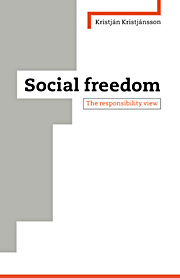Book contents
- Frontmatter
- Contents
- Acknowledgements
- 1 Introduction: freedom from Berlin onwards
- 2 Negative freedom: the nature of constraints
- 3 Obstacles and their weight
- 4 The test of moral responsibility
- 5 Internal bars and positive liberty
- 6 Freedom and power
- 7 Observations on method
- 8 Concluding remarks
- Bibliography
- Index
2 - Negative freedom: the nature of constraints
Published online by Cambridge University Press: 31 March 2010
- Frontmatter
- Contents
- Acknowledgements
- 1 Introduction: freedom from Berlin onwards
- 2 Negative freedom: the nature of constraints
- 3 Obstacles and their weight
- 4 The test of moral responsibility
- 5 Internal bars and positive liberty
- 6 Freedom and power
- 7 Observations on method
- 8 Concluding remarks
- Bibliography
- Index
Summary
Although all negative accounts concur in defining freedom as the absence of constraints, it is common knowledge that they differ substantially among themselves. The basic question to ask about each of them is what counts as a constraint on freedom. Thus, we are often told, it is possible to distinguish between narrower and broader accounts of negative liberty. While that is true, this distinction is itself not as unproblematic as we are sometimes given to believe. There is a certain elasticity in the terms ‘narrow’ and ‘broad’ as they are used in this context. For instance, it cannot be assumed that the stronger or more specific demands a given account makes about the nature of the proposed constraints, the narrower it is. At least one other question has to be asked, namely, interpretive question (c) from chapter 1 (p. 8) about the necessary weight or efficacy of the obstacles described. For instance, Hobbes' famous corporeal-freedom account of liberty, which I shall examine shortly, is commonly considered narrow not because of the strict conditions it sets upon the nature of constraints (in fact, it does anything but that), but because it requires the weight of constraints to be such as to make a proposed action literally impossible. By contrast, while another traditional negative-liberty account, the intentionality view commonly ascribed, inter alia, to Berlin, sets stricter conditions on the nature of putative constraints by requiring that they be deliberately imposed by another agent, this conception is typically more permissive on the weight-question, requiring only that the constraint render a given course of action ineligible to a normal (reasonable, prudent) person.
- Type
- Chapter
- Information
- Social FreedomThe Responsibility View, pp. 16 - 37Publisher: Cambridge University PressPrint publication year: 1996



